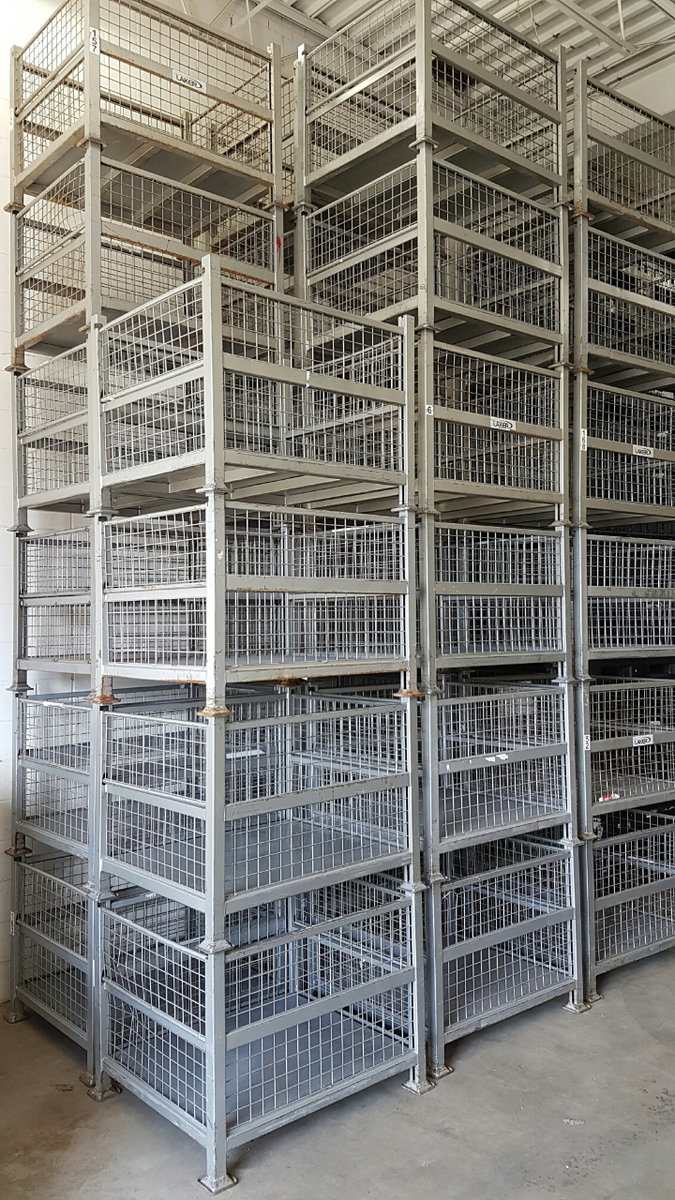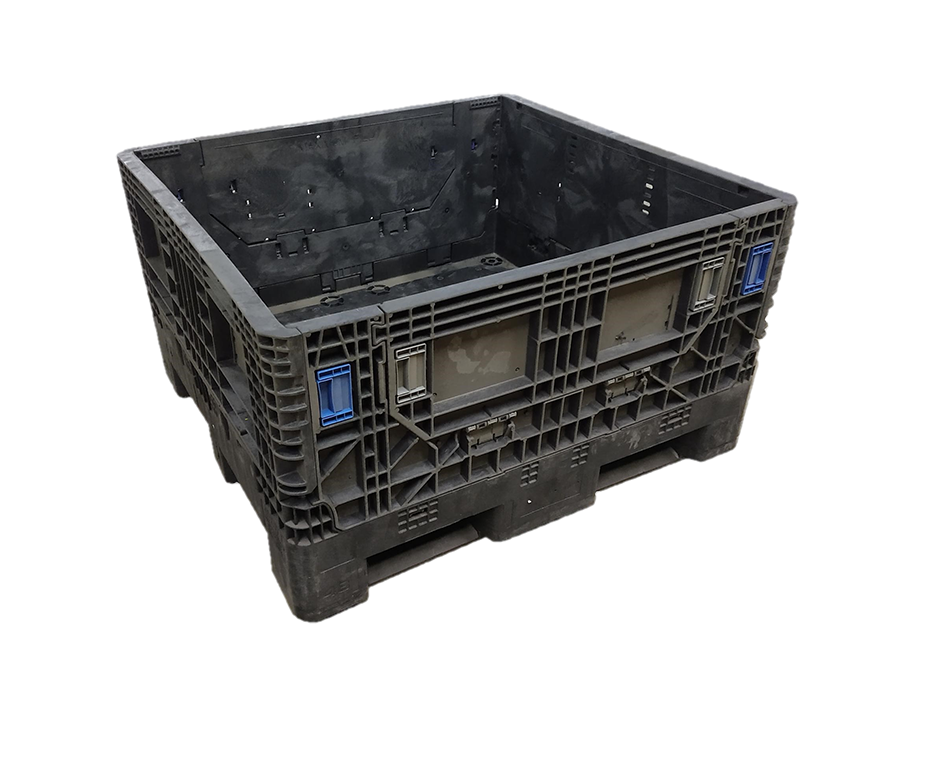Innovative Solutions: Finding the Convenience of Mass Containers in Numerous Industries
Mass containers have actually emerged as a crucial advancement across numerous sectors. Their design enhances storage space and transportation performance, accommodating varied demands while advertising sustainability. Companies in agriculture, production, and logistics report significant renovations in operational processes. However, real degree of their impact might not yet be totally understood. Checking out the various applications and benefits of mass containers can reveal insights that reshape sector criteria. What exists in advance for this developing remedy?
Enhancing Agricultural Efficiency With Bulk Containers
How can mass containers change agricultural methods? In the domain of agriculture, bulk containers act as a crucial innovation, improving efficiency and sustainability. They enable farmers to keep and transfer huge amounts of fertilizers, grains, and seeds, minimizing the need for numerous smaller sized bundles that commonly add to lose. By utilizing bulk containers, farming operations can optimize their supply chains, lowering handling prices and time. These containers are made for easy loading and dumping, permitting swift shifts in between various stages of farming processes.
Bulk containers promote far better inventory management, guaranteeing that manufacturers have appropriate products on hand without unwanted. This effectiveness converts to minimized labor prices and improved productivity. In a field often challenged by varying need and seasonal variations, the reliability and scalability supplied by bulk containers provide a considerable advantage, equipping farmers to focus on quality and yield.
Improving Manufacturing Processes With Mass Solutions
Bulk options play an important function in streamlining manufacturing processes by promoting effective product handling and providing cost-effective storage space options. These containers aid maintain an organized manufacturing atmosphere, ultimately boosting operations and productivity. As markets significantly adopt bulk services, they are likely to experience significant enhancements in operational efficiency.
Effective Product Handling

Reliable material handling is essential for maximizing manufacturing processes, as it straight affects productivity and cost-effectiveness. Making use of mass containers can significantly enhance procedures by simplifying the activity and storage space of products. Their style permits simple loading and unloading, minimizing the time employees invest taking care of specific items. This efficiency not only decreases labor prices yet also improves workflow, making it possible for suppliers to respond quickly to demand variations. In enhancement, mass containers promote better organization within centers, promoting quick access to materials and reducing downtime. By carrying out these versatile remedies, producers can improve overall functional effectiveness, guaranteeing that assembly line run smoothly and efficiently while minimizing waste and source expense. Consequently, mass containers play a vital role in enhancing material handling techniques.
Affordable Storage Space Solutions
As manufacturers seek to enhance their operations, cost-effective storage solutions come to be increasingly crucial. Bulk containers supply a functional ways of saving large quantities of products, lowering the need for several smaller storage space devices. This combination results in decrease stock prices, as mass containers often need less handling and cause decreased labor expenditures. Additionally, their standardized dimensions promote efficient stacking and storage, maximizing warehouse space. By utilizing mass containers, makers can minimize waste and improve the overall company of their facilities. These containers are also designed for toughness, which can reduce substitute expenses in time. In general, integrating bulk containers right into storage approaches enables manufacturers to streamline operations while keeping success and performance in their supply chains.

Improved Manufacturing Process
Using bulk containers substantially enhances manufacturing process by streamlining the monitoring of materials throughout the manufacturing procedure. These containers facilitate effective storage space and transportation, reducing the time invested in dealing with products. Therefore, producers can attain quicker turnaround times and decrease hold-ups in manufacturing. Bulk containers likewise advertise far better company, allowing teams to conveniently access raw products when needed, which even more enhances procedures. Furthermore, the standardized dimension and shape of these containers allow maximized use warehouse space, adding to general effectiveness. By incorporating mass options right into their procedures, business can enhance supply control and minimize waste, ultimately causing enhanced performance and a much more dexterous manufacturing atmosphere.
Reinventing Food Service Logistics
The food solution sector is going through considerable makeover with the fostering of mass containers, improving storage space capabilities and enhancing space use. Efficient storage space options make it possible for services to handle supply better, while structured transportation processes minimize prices and enhance distribution times. Because of this, these developments are improving logistics and driving greater efficiency across the field.
Efficient Storage Solutions
Ingenious storage remedies are changing food service logistics by improving effectiveness and enhancing space use. Mass containers, designed for maximum capability, permit food company to decrease squandered space while preserving simple access to products. These containers can be piled and arranged according to stock requirements, streamlining the storage procedure. In addition, their resilience guarantees that foodstuff continue to be safe and secure and secure, lowering spoilage and losses. With features such as modular designs and compatibility with numerous shelving systems, these containers can adapt to varied kitchen area layouts. By employing efficient storage space options, food solution procedures not only improve process yet also boost overall efficiency, guaranteeing that sources are utilized efficiently to meet customer demands.
Structured Transport Procedures
While many aspects add to the effectiveness of food solution logistics, structured transport processes play an essential role in maximizing supply chain procedures. The adoption of bulk containers greatly boosts the activity of products, allowing for quicker loading and dumping at distribution. Their standard sizes assist in reliable piling and storage, decreasing wasted space during transportation. In addition, mass containers reduce the demand for excessive product packaging, bring about reduce costs and reduced ecological impact. By making certain that items are firmly transported, they alleviate damages and putridity, which is essential in the perishable food industry. On the whole, the assimilation of mass containers right into transport techniques not just enhances operational effectiveness however also sustains lasting practices within the food solution sector.
The Role of Bulk Containers in Pharmaceutical Supply Chains
In the pharmaceutical sector, mass containers play a vital duty in ensuring the effective and risk-free transportation of basic materials and finished products. These containers are specifically created to fulfill rigid regulatory needs, offering optimal security against contamination and deterioration throughout transportation. Their durable building enables the protected transport of delicate materials, such as active pharmaceutical active ingredients (APIs) and complicated solutions, while reducing the risk of damages.
Moreover, mass containers assist in structured handling and storage space procedures within stockrooms and manufacturing centers. Their standard sizes allow compatibility with automated systems, enhancing productivity and decreasing labor expenses. By utilizing mass containers, pharmaceutical business can achieve significant price savings via bulk investing in and reduced packaging waste.
Promoting Sustainability in Product Packaging Practices
The pharmaceutical sector's enhancing dependence on bulk containers has prompted a more comprehensive evaluation of sustainability in packaging techniques across different fields. As companies look for to reduce their environmental effect, ingenious approaches to product packaging have actually gotten traction. Bulk containers, made for reuse and recycling, offer a useful option. Their toughness prolongs product lifecycles, lessening the requirement for single-use product packaging.
Furthermore, the shift towards naturally degradable materials and green finishes has come to be important in the layout of these containers. This change not only addresses waste reduction however additionally lines up with customer need for lasting products.
Industries such as food and cosmetics are taking on comparable strategies, identifying that sustainable product packaging can boost brand name online reputation. Joint efforts in between suppliers and suppliers even more advertise sustainability, motivating the advancement of closed-loop systems - used collapsible containers. Eventually, accepting sustainable packaging methods is essential for cultivating a round economic climate and reducing the ecological footprint throughout varied markets
Cost-Effective Transport Solutions With Bulk Containers

In addition, bulk containers improve dealing with processes, resulting in decreased labor costs and minimizing the danger of damage throughout transit. Industries such as agriculture, chemicals, and pharmaceuticals take advantage of the durability and robustness of these containers, which can hold up against rough conditions while making sure the honesty of their contents
Moreover, the multiple-use nature of mass containers adds to lasting financial savings, as companies can rely upon less, extra long lasting systems as opposed to frequently replacing single-use product packaging. In this means, mass containers not just boost efficiency however additionally support overall price administration in supply chain operations.
Modification and Flexibility wholesale Container Style
While several bulk containers are created for conventional applications, their customization and versatility have actually ended up being important features for industries with one-of-a-kind requirements. Suppliers currently use a range of choices, allowing customers to customize containers to particular measurements, materials, and performances. This flexibility allows organizations to enhance storage and transportation processes, making certain compatibility with different website taking care of systems.
For example, the food and pharmaceutical industries typically require containers that satisfy strict health and safety and security criteria. Custom-made designs might include attributes such as tamper-proof seals, easy-to-clean surface areas, and specialized air flow systems. In the agricultural industry, mass containers can be customized to assist in the transport of diverse products, from grains to fluids, improving operational efficiency.
Eventually, the capability to tailor bulk containers not only increases efficiency but additionally supports sustainability efforts by decreasing waste and maximizing source usage across multiple sectors. This adaptability placements bulk containers as versatile services in today's vibrant market.
Frequently Asked Concerns
What Materials Are Bulk Containers Typically Made From?
Bulk containers are usually made from materials such as high-density polyethylene (HDPE), light weight aluminum, steel, or polypropylene. These materials offer durability, resistance to chemicals, and the capability to securely keep and deliver various products across industries.
How Are Mass Containers Cleaned Between Uses?
Bulk containers are typically cleaned up utilizing high-pressure cleaning, steam cleaning, or chemical sanitization methods (refurbished bulk containers). The cleaning procedure assurances that deposits are gotten rid of, avoiding contamination and keeping the top quality of contents for succeeding uses

Can Bulk Containers Be Recycled Several Times?
Yes, bulk containers can be recycled several times. Their robust design enables duplicated use across numerous applications, supplied they are correctly cleaned and maintained after each usage to guarantee safety and hygiene standards.
What Are the Weight Purviews for Mass Containers?
Weight limits for mass containers generally vary from 1,000 to 3,000 extra pounds, depending upon the product and design. Requirements may differ by producer, so it is critical to get in touch with guidelines for details container types.
Exist Typical Sizes for Mass Containers?
Yes, there are basic dimensions for mass containers, normally varying from 20 to 40 cubic feet. These dimensions promote reliable storage space and transport throughout different sectors, making certain compatibility with devices and enhancing room usage.
Using mass containers can markedly simplify operations by streamlining the motion and storage of materials. In enhancement, mass containers advertise far better company within facilities, promoting fast accessibility to products and reducing downtime. Bulk containers offer a practical means of saving big amounts of materials, minimizing the requirement for multiple smaller sized storage devices. The food service sector is going through substantial change via the fostering of bulk containers, enhancing storage capacities and maximizing area application. Bulk containers assist in streamlined handling and storage procedures within storehouses and production facilities.